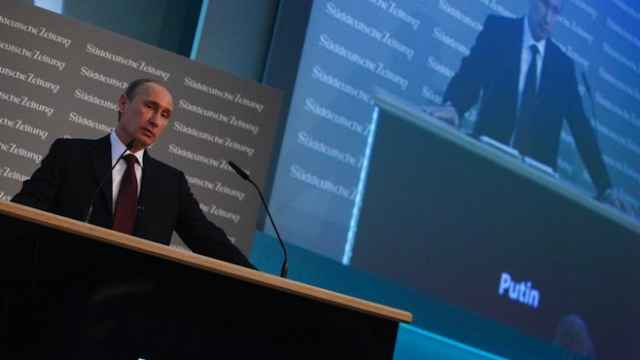For hapless officials across Russia, President Putin's annual call-in marathon is a wake-up call like no other.
This year, the president received more than 5 million questions, many asking for his assistance. The show lasted for 3 hours 40 minutes, with Putin answering 80 questions from across the nation.
After presenting their concerns to the great leader himself, Russians all over the country are now seeing their problems being solved.
Here is just a small selection of things that have already changed for ordinary Russian citizens, less than 24 hours after Putin's television phone-in with the nation.
Broken Roads in Omsk
Officials in the Siberian city of Omsk have promised to repair 21 roads in the city after one resident complained to Putin during the show's very first call.
“Look at the condition of our roads: one hole after another. Our cars break down and wheels fall off. The government does not respond to our concerns and requests,” Omsk resident Yekaterina told the president via a video call, even showing him one of the pot-holed roads.
Omsk authorities have reacted before the program had even ended. Before three hours were out, one television presenter announced the roads would be mended by May 1.
Children's Camp for Yaroslavl Wonderkid
One academically-gifted eight year-old from Yaroslavl, Ilya Rayevsky, complained to the president that he had not been accepted into the prestigious Artek summer camp due to his young age.
“This is obvious neglect,” said Putin. “It means that those who are organizing this camp were not wonderkids themselves, and we'll fix that.”
Yaroslavl officials stepped in to solve the problem, promising that the boy will attend Artek during the upcoming summer.
Ilya, who is already studying in the fifth grade and is fond of science, has been invited to Moscow's Skolkovo innovation foundation to share his ideas.
Criminal cases over unpaid wages in Sakhalin and North Ossetia
Complaints from workers at several Russian businesses that their wages had been delayed sparked Putin's outrage- and quick responses from officials.
Russia's Investigative Committee in the Sakhalin region opened a criminal case into the director of the Ostrovnoy fish plant on Shikotan island minutes after the workers turned to the president to help them claim unpaid wages.
Workers told Putin that they found themselves in the position of slaves, that they hadn't received wages for several months, and that they didn't even have money to leave the island. They also said that an appeal to the prosecutor's office had brought no results.
The plant currently owes 53 of its workers 6.8 million rubles ($102,000) in unpaid work. On Friday, the company's director general, Alexei Popov, apologized to staff for the delays and reimbursed them with part of their owed wages. He explained that delays in were caused by a bad catch.
A criminal case has also been opened into BPS-Gidrostroy, a building company in Russia's republic of North Ossetia, following a phone-in complaint. BPS-Gidrostroy owes unpaid wages worth 63 million rubles ($947,000) to 750 of its employees.
Long-awaited wages for Chelyabinsk workers
Another case involving delayed payments raised during Putin's call-in show had a happier ending.
Employees at the Uralavtopritsep factory in Chelyabinsk received their wages in full three hours after asking Putin for help.
Father of four Dmitry Dudkin told Putin that workers hadn't received wages for three months.
Although the President noted that the automotive sector had been badly affected by the crisis, he told the audience, “but to not pay wages- it shouldn't be like this.”
The Russian Investigative Committee branch in the Chelyabinsk region has also started the looking into the case.
The plant paid its employees a total of 13 million rubles ($195,000) in unpaid wages.
Plots of land for large families in the Stavropol region
A mother from the town of Nevinnomyssk in the Stavropol region was given a plot of land from local authorities after she pleaded for Putin to help.
In her letter, Maria Solomatina said her family had been given a plot of land in the Stavropol region but had later lost it due to changes in regional law that reclassified large families like hers to be not 'in need.'
Solomatina’s appeal could make the life of other large families in the region easier too.
Governor of the Stavropol region, Vladimir Vladimirov, has announced that the local government will simplify the registration procedure for large families in order to improve their living conditions.
Contact the author at [email protected]
A Message from The Moscow Times:
Dear readers,
We are facing unprecedented challenges. Russia's Prosecutor General's Office has designated The Moscow Times as an "undesirable" organization, criminalizing our work and putting our staff at risk of prosecution. This follows our earlier unjust labeling as a "foreign agent."
These actions are direct attempts to silence independent journalism in Russia. The authorities claim our work "discredits the decisions of the Russian leadership." We see things differently: we strive to provide accurate, unbiased reporting on Russia.
We, the journalists of The Moscow Times, refuse to be silenced. But to continue our work, we need your help.
Your support, no matter how small, makes a world of difference. If you can, please support us monthly starting from just $2. It's quick to set up, and every contribution makes a significant impact.
By supporting The Moscow Times, you're defending open, independent journalism in the face of repression. Thank you for standing with us.
Remind me later.




